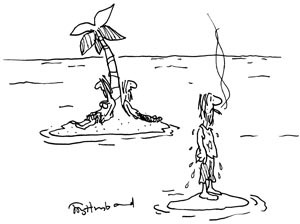Stories abound of figures for whom the allure of the Left is eroded by cynicism and honest self-interest. Most treat their previous affiliation as a species of deluded immaturity; going Right is a natural consequence of growing up, albeit in early middle age. Alan Sillitoe is different. He too in the early Sixties was a radical leftist but his views changed incrementally and, most significantly, as the result of his private ordinance that opinions must be based on personal experience.
His first visit to the Soviet Union is documented in Road to Volgograd (1964), and in his latest book he tells of trips he made at the end of the Sixties and his involvement in the defection, in London, of the Soviet writer Anatoly Kuznetsov. Sillitoe had become the prize of the Soviet intelligentsia, a novelist who was promoted, debated, taught in universities, as the only genuine spokesman for the oppressed working classes of the West. His sales, in translation, had turned him into a rouble millionaire. Such irony.
So Gadfly in Russia is fascinating. Much of it involves a 1967 grand tour in his Peugeot estate accompanied by his Writers Union minder George Anjaparidze. Their journey — by parts touching, hilarious, compulsive, hair-raising — makes On the Road seem tame. Sillitoe is an unostentatious stylist and all the better for that; he blends candour with quiet elegance. In Moscow he looks out of his hotel window and finds himself staring into the face of a young woman who sits casually, cigarette in hand, on the pitched roof of the adjoining building, the gleaming domes of the Kremlin framing her image. She is dressed in overalls, her brightly coloured headscarf has slipped down to her neck and she smiles. She is replacing tiles and she dances around her domain like a bird, joyously alert to what seems a special brand of freedom. It is a beautiful moment but it is buttressed by a fantasy, one that dissolves as he continues his journey.
The most moving strand of the tale unfolds very gradually: Sillitoe’s hesitant but eventually enduring friendship with George. George’s father had died in the early months of the war and on the anniversary of the Nazi invasion he and Sillitoe find themselves following a convoy of highly tuned German sports cars taking part in the Berlin to Moscow rally. They consider the bizarre coincidence and Alan comments, ‘They’re full of middle-aged men and the timing can’t be accidental. After Moscow they’ll push on to Kharkov and Kiev, swapping yarns, standing on hills with their old staff maps….’ So a race begins for Moscow, the doddering old Peugeot thrashed past each emblem of Teutonic prestige to the increasing delight of Sillitoe and George.
Sillitoe offers us a rare insight into ordinary life in the Soviet Union at the height of the Cold War, a perspective granted to few from the West and only those thought sympathetic. How wrong they were. There are no lazy generalisations but his account is peppered with portraits of individuals, none quite the same but all part of a collective tragedy. His love for the place and the people is tangible but his contempt for the system that has ruined their lives seeps through. He makes it clear, also, that some things survived the revolution, notably anti-Semitism. From the Seventies onwards Sillitoe would campaign tirelessly on behalf of a large number of Soviet political prisoners.
The Kuznetsov defection is still shrouded in mystery. Whether the British security services played any part in it will probably not be known for a generation. George was involved, unwittingly, because he was Kuznetsov’s escort in London and was enjoying a day out with Sillitoe when the writer disappeared. Sillitoe tells as much as he knows — probably — and it is gripping stuff.
One last moment. When they visit Tolstoy’s estate the place is eerily deserted, with not a single tourist or guide in evidence. Tolstoy had asked to be interred, with no headstone, next to the modest bench where he would sit during the summer. Sillitoe and George are at this spot when, silently, without introduction, a tall, elegantly attired man joins them. He seems at least 80, his suit appears to predate the Revolution, and he speaks to them in French. ‘Writers come here often,’ he observes, ‘but there will never be anyone to compare with him.’ He glances at the mound of earth, bids them a respectful farewell and sets off back to the house. If you wish to find out who he was, read the book.
Richard Bradford’s authorised biography of Alan Sillitoe will be published by Peter Owen in 2008.





Comments